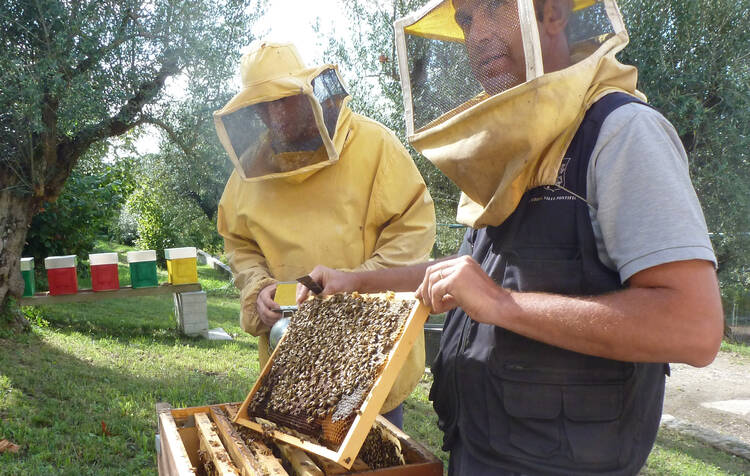“I know their suffering,” the Lord said to Moses in witness to the enslavement of the people of Israel, “and I have come down to deliver them from the Egyptians, and to bring them up out of that land to a good and broad land, a land flowing with milk and honey” (Ex 3:7-8).
Sixteen times Scripture describes Israel as a land of milk and honey, and there are an additional 39 references to honey in the Bible. It was long assumed that these references concerned primarily a sweet substance extracted from figs and dates, as wild bees make an appearance only twice in the biblical literature (Judges 14:8-9 and 1 Sam 14:27). However, an archeological project at Tel Reḥov in the Beth-Shean Valley of Israel has unearthed the remains of a large apiary that housed an estimated 100 clay hives, indicating the practice of apiculture (beekeeping) in the period of the First Temple.
Some English colonists of the New World believed they had come into a new Canaan, and John Winthrop’s Papersportray the sojourn across the Atlantic as a crossing of the Red Sea into the promised land. Last June in this, our new land of milk and honey, the bodies of 300 entire colonies of bees were found dead on an asphalt parking lot in Oregon. In 2012-2013, U.S. beekeepers on average lost 45.1% of their colonies. Jim Brown, the husband of one of my colleagues who cares for a hive in his backyard, reports that his bees did not survive last winter.
Colony Collapse Disorder (CCD) has been afflicting hives around the world since the mid-1990s. Bees are also suffering from habitat degradation, climate change and widespread infestations of varrora and tracheal mites. Not long ago a beekeeper could start a new hive and let the innate wisdom of the bees take its course with minimal human intervention, but today even vigilant care of a hive cannot ensure its survival.
At risk are not only bees and their sweet golden honey that graces our kitchens but also plums, peaches, cherries, apricots, strawberries, raspberries, blueberries, currants, apples, pears, tomatoes, squash, eggplant, peppers, melons, almonds and other crops. Of the 100 varieties of food most commonly consumed by humans, 70 are pollinated by bees. Vincenzo Scaccioni, head of Agricultural Operations at Castel Gandolfo, emphasizes the bees’ indispensable contribution to Pope Francis’ Farm.
There are multiple hypotheses about the cause of Colony Collapse Disorder, but growing evidence indicates that one contributing factor may be a class of neurotoxic insecticides known as neonicotinoids. A strong dose of neonicotinoids can kill bees outright by damaging their nervous system. At lower levels, the insecticide suppresses the bees’ immune system and disrupts their ability to forage, navigate, remember and communicate. Imidacloprid, one compound in the neonicotinoid family, is the most widely used insecticide in the world. The seeds of corn, soy, wheat, canola, and many other crops are pretreated with imidacloprid, and the insecticide is also used for lawn maintenance, landscaping, termite and flea control, and the treatment of nursery plants that we commonly purchase for our yards. Water-soluble neonicotinoids are taken up through the roots and leaves of plants and thereby enter the pollen and nectar that bees carry back to their hives. Once neonicotinoids enter the environment, they can remain there for five years, affecting not only bees but also butterflies, dragonflies, ladybugs and lacewings.
In January 2013, the European Food and Safety Authority (EFSA) concluded after a review of scientific literature that neonicotinoids put bees at an unacceptably high risk. The European Commission consequently suspended the use of three neonicotinoids in the European Union effective December 2013. Here in the land English colonists believed to be the promised Canaan, the EPA will not consider any action until an insecticide Registration Review scheduled for 2018.
“Some have said,” the Roman poet Virgil (70-10 BCE) reflected in Georgics, “that a share of divine intelligence is in bees.” The early Christian theologian Origen of Alexandria (185-232) believed that bees evidence God’s providential design and that the cooperative bee society is a paradigm for the ideal community of believers. Ambrose of Milan (340-397) the patron saint of bees, wrote of the bee’s sweet labor, the honey that is balm for our wounds, and the beauty and delicacy of the construction of the comb that supplies “without distinction the same sweetness to kings and to commoners.” The bee, he noted in his Hexameron, “though weak in body, manifests her strength in the vigor of her wisdom and in her high regard for virtuous deeds.”
May we act with no less wisdom and virtue. Congressional Representatives John Conyers (Mich.) and Earl Blumenauer (Ore.) have introduced HR 2692: Save America’s Pollinator Act, legislation that would suspend seed treatment, soil application, and foliar use of certain neonicotinoid pesticides until a full review of scientific literature is conducted and further field studies are done to assess the pesticides’ short and long term effects on pollinators. In July, the legislation was referred to committee, and, according to govtrack.us, its chances of becoming law are 0%. Can the intersession of St. Ambrose and visits, letters, and petitions to our representatives in Congress change this prognosis? Internet tools can enable you to write your own petition.
“How sweet are your words to my taste, sweeter than honey to my mouth!” (Ps 119:103). What will the psalmist’s song of praise to God mean to our children if they never once have the opportunity to dip a spoon into a jar, trickle transparent golden liquid onto a crisp slice of apple, and taste on their tongues the distilled sweetness of the summer’s clover nectar?
Elizabeth Groppe is director of the Center for Spirituality at Saint Mary’s College in Notre Dame, Indiana.








